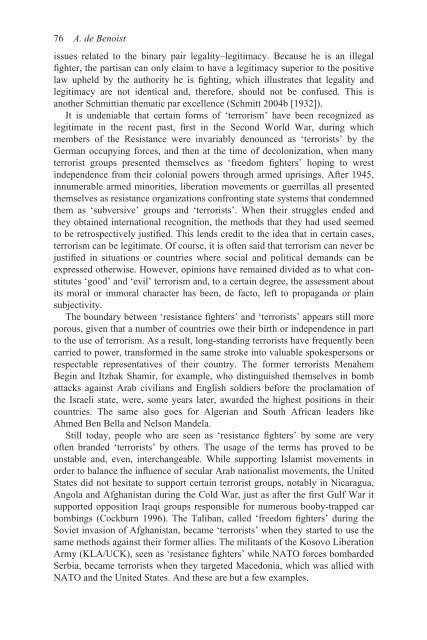The International Political Thought of Carl Schmitt: Terror, Liberal ...
The International Political Thought of Carl Schmitt: Terror, Liberal ...
The International Political Thought of Carl Schmitt: Terror, Liberal ...
Create successful ePaper yourself
Turn your PDF publications into a flip-book with our unique Google optimized e-Paper software.
76 A. de Benoist<br />
issues related to the binary pair legality–legitimacy. Because he is an illegal<br />
fighter, the partisan can only claim to have a legitimacy superior to the positive<br />
law upheld by the authority he is fighting, which illustrates that legality and<br />
legitimacy are not identical and, therefore, should not be confused. This is<br />
another <strong>Schmitt</strong>ian thematic par excellence (<strong>Schmitt</strong> 2004b [1932]).<br />
It is undeniable that certain forms <strong>of</strong> ‘terrorism’ have been recognized as<br />
legitimate in the recent past, first in the Second World War, during which<br />
members <strong>of</strong> the Resistance were invariably denounced as ‘terrorists’ by the<br />
German occupying forces, and then at the time <strong>of</strong> decolonization, when many<br />
terrorist groups presented themselves as ‘freedom fighters’ hoping to wrest<br />
independence from their colonial powers through armed uprisings. After 1945,<br />
innumerable armed minorities, liberation movements or guerrillas all presented<br />
themselves as resistance organizations confronting state systems that condemned<br />
them as ‘subversive’ groups and ‘terrorists’. When their struggles ended and<br />
they obtained international recognition, the methods that they had used seemed<br />
to be retrospectively justified. This lends credit to the idea that in certain cases,<br />
terrorism can be legitimate. Of course, it is <strong>of</strong>ten said that terrorism can never be<br />
justified in situations or countries where social and political demands can be<br />
expressed otherwise. However, opinions have remained divided as to what constitutes<br />
‘good’ and ‘evil’ terrorism and, to a certain degree, the assessment about<br />
its moral or immoral character has been, de facto, left to propaganda or plain<br />
subjectivity.<br />
<strong>The</strong> boundary between ‘resistance fighters’ and ‘terrorists’ appears still more<br />
porous, given that a number <strong>of</strong> countries owe their birth or independence in part<br />
to the use <strong>of</strong> terrorism. As a result, long-standing terrorists have frequently been<br />
carried to power, transformed in the same stroke into valuable spokespersons or<br />
respectable representatives <strong>of</strong> their country. <strong>The</strong> former terrorists Menahem<br />
Begin and Itzhak Shamir, for example, who distinguished themselves in bomb<br />
attacks against Arab civilians and English soldiers before the proclamation <strong>of</strong><br />
the Israeli state, were, some years later, awarded the highest positions in their<br />
countries. <strong>The</strong> same also goes for Algerian and South African leaders like<br />
Ahmed Ben Bella and Nelson Mandela.<br />
Still today, people who are seen as ‘resistance fighters’ by some are very<br />
<strong>of</strong>ten branded ‘terrorists’ by others. <strong>The</strong> usage <strong>of</strong> the terms has proved to be<br />
unstable and, even, interchangeable. While supporting Islamist movements in<br />
order to balance the influence <strong>of</strong> secular Arab nationalist movements, the United<br />
States did not hesitate to support certain terrorist groups, notably in Nicaragua,<br />
Angola and Afghanistan during the Cold War, just as after the first Gulf War it<br />
supported opposition Iraqi groups responsible for numerous booby-trapped car<br />
bombings (Cockburn 1996). <strong>The</strong> Taliban, called ‘freedom fighters’ during the<br />
Soviet invasion <strong>of</strong> Afghanistan, became ‘terrorists’ when they started to use the<br />
same methods against their former allies. <strong>The</strong> militants <strong>of</strong> the Kosovo Liberation<br />
Army (KLA/UCK), seen as ‘resistance fighters’ while NATO forces bombarded<br />
Serbia, became terrorists when they targeted Macedonia, which was allied with<br />
NATO and the United States. And these are but a few examples.
















